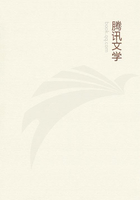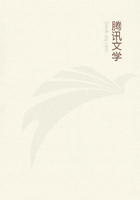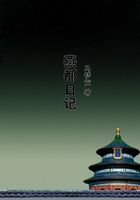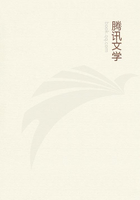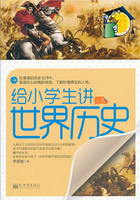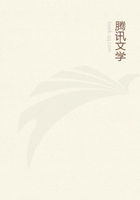"Aias, unbridled tongue, why these vain words To me? Thou hast called me pestilent, niddering, And weakling: yet I boast me better far Than thou in wit and speech, which things increase The strength of men. Lo, how the craggy rock, Adamantine though it seem, the hewers of stone Amid the hills by wisdom undermine Full lightly, and by wisdom shipmen cross The thunderous-plunging sea, when mountain-high It surgeth, and by craft do hunters quell Strong lions, panthers, boars, yea, all the brood Of wild things. Furious-hearted bulls are tamed To bear the yoke-bands by device of men.
Yea, all things are by wit accomplished. Still It is the man who knoweth that excels The witless man alike in toils and counsels.
For my keen wit did Oeneus' valiant son Choose me of all men with him to draw nigh To Hector's watchmen: yea, and mighty deeds We twain accomplished. I it was who brought To Atreus' sons Peleides far-renowned, Their battle-helper. Whensoe'er the host Needeth some other champion, not for the sake Of thine hands will he come, nor by the rede Of other Argives: of Achaeans I Alone will draw him with soft suasive words To where strong men are warring. Mighty power The tongue hath over men, when courtesy Inspires it. Valour is a deedless thing;
And bulk and big assemblage of a man Cometh to naught, by wisdom unattended.
But unto me the Immortals gave both strength And wisdom, and unto the Argive host Made me a blessing. Nor, as thou hast said, Hast thou in time past saved me when in flight From foes. I never fled, but steadfastly Withstood the charge of all the Trojan host.
Furious the enemy came on like a flood But I by might of hands cut short the thread Of many lives. Herein thou sayest not true Me in the fray thou didst not shield nor save, But for thine own life roughtest, lest a spear Should pierce thy back if thou shouldst turn to flee From war. My ships? I drew them up mid-line, Not dreading the battle-fury of any foe, But to bring healing unto Atreus' sons Of war's calamities: and thou didst set Far from their help thy ships. Nay more, I seamed With cruel stripes my body, and entered so The Trojans' burg, that I might learn of them All their devisings for this troublous war.
Nor ever I dreaded Hector's spear; myself Rose mid the foremost, eager for the fight, When, prowess-confident, he defied us all.
Yea, in the fight around Achilles, I Slew foes far more than thou; 'twas I who saved The dead king with this armour. Not a whit I dread thy spear now, but my grievous hurt With pain still vexeth me, the wound I gat In fighting for these arms and their slain lord.
In me as in Achilles is Zeus' blood."
He spake; strong Aias answered him again.
"Most cunning and most pestilent of men, Nor I, nor any other Argive, saw Thee toiling in that fray, when Trojans strove Fiercely to hale away Achilles slain.
My might it was that with the spear unstrung The knees of some in fight, and others thrilled With panic as they pressed on ceaselessly.
Then fled they in dire straits, as geese or cranes Flee from an eagle swooping as they feed Along a grassy meadow; so, in dread The Trojans shrinking backward from my spear And lightening sword, fled into Ilium To 'scape destruction. If thy might came there Ever at all, not anywhere nigh me With foes thou foughtest: somewhere far aloot Mid other ranks thou toiledst, nowhere nigh Achilles, where the one great battle raged."
He spake; replied Odysseus the shrewd heart:
"Aias, I hold myself no worse than thou In wit or might, how goodly in outward show Thou be soever. Nay, I am keener far Of wit than thou in all the Argives' eyes.
In battle-prowess do I equal thee Haply surpass; and this the Trojans know, Who tremble when they see me from afar.
Aye, thou too know'st, and others know my strength By that hard struggle in the wrestling-match, When Peleus' son set glorious prizes forth Beside the barrow of Patroclus slain."
So spake Laertes' son the world-renowned.
Then on that strife disastrous of the strong The sons of Troy gave judgment. Victory And those immortal arms awarded they With one consent to Odysseus mighty in war.
Greatly his soul rejoiced; but one deep groan Brake from the Greeks. Then Aias' noble might Stood frozen stiff; and suddenly fell on him Dark wilderment; all blood within his frame Boiled, and his gall swelled, bursting forth in flood.
Against his liver heaved his bowels; his heart With anguished pangs was thrilled; fierce stabbing throes Shot through the filmy veil 'twixt bone and brain;
And darkness and confusion wrapped his mind.
With fixed eyes staring on the ground he stood Still as a statue. Then his sorrowing friends Closed round him, led him to the shapely ships, Aye murmuring consolations. But his feet Trod for the last time, with reluctant steps, That path; and hard behind him followed Doom.
When to the ships beside the boundless sea The Argives, faint for supper and for sleep, Had passed, into the great deep Thetis plunged, And all the Nereids with her. Round them swam Sea-monsters many, children of the brine.
Against the wise Prometheus bitter-wroth The Sea-maids were, remembering how that Zeus, Moved by his prophecies, unto Peleus gave Thetis to wife, a most unwilling bride.
Then cried in wrath to these Cymothoe:
"O that the pestilent prophet had endured All pangs he merited, when, deep-burrowing, The eagle tare his liver aye renewed!"
So to the dark-haired Sea-maids cried the Nymph.
Then sank the sun: the onrush of the night Shadowed the fields, the heavens were star-bestrewn;
And by the long-prowed ships the Argives slept By ambrosial sleep o'ermastered, and by wine The which from proud Idomeneus' realm of Crete:
The shipmen bare o'er foaming leagues of sea.
But Aias, wroth against the Argive men, Would none of meat or drink, nor clasped him round The arms of sleep. In fury he donned his mail, He clutched his sword, thinking unspeakable thoughts;


